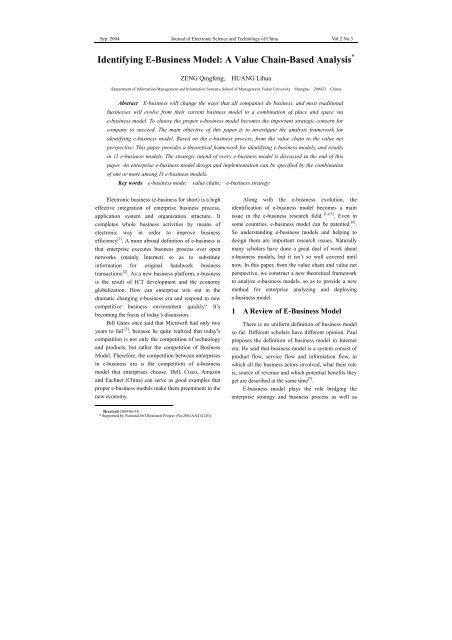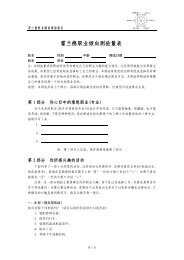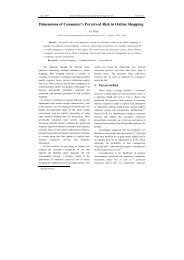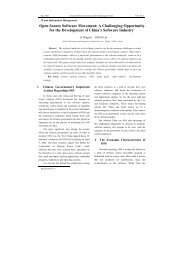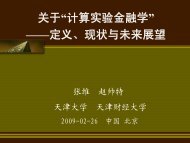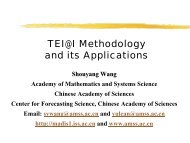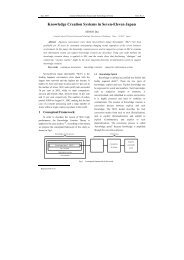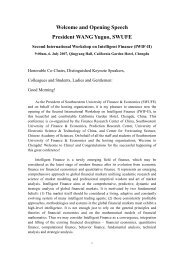Identifying E-Business Model: A Value Chain-Based Analysis
Identifying E-Business Model: A Value Chain-Based Analysis
Identifying E-Business Model: A Value Chain-Based Analysis
You also want an ePaper? Increase the reach of your titles
YUMPU automatically turns print PDFs into web optimized ePapers that Google loves.
Sep. 2004 Journal of Electronic Science and Technology of China Vol.2 No.3<br />
<strong>Identifying</strong> E-<strong>Business</strong> <strong>Model</strong>: A <strong>Value</strong> <strong>Chain</strong>-<strong>Based</strong> <strong>Analysis</strong> *<br />
ZENG Qingfeng, HUANG Lihua<br />
(Department of Information Management and Information Systems, School of Management, Fudan University Shanghai 200433 China)<br />
Abstract E-business will change the ways that all companies do business, and most traditional<br />
businesses will evolve from their current business model to a combination of place and space via<br />
e-business model. To choose the proper e-business model becomes the important strategic concern for<br />
company to succeed. The main objective of this paper is to investigate the analysis framework for<br />
identifying e-business model. <strong>Based</strong> on the e-business process, from the value chain to the value net<br />
perspective. This paper provides a theoretical framework for identifying e-business models, and results<br />
in 11 e-business models. The strategic intend of every e-business model is discussed in the end of this<br />
paper. An enterprise e-business model design and implementation can be specified by the combination<br />
of one or more among 11 e-business models.<br />
Key words e-business mode; value chain; e-business strategy<br />
Electronic business (e-business for short) is a high<br />
effective integration of enterprise business process,<br />
application system and organization structure. It<br />
completes whole business activities by means of<br />
electronic way in order to improve business<br />
efficiency [1] . A more abroad definition of e-business is<br />
that enterprise executes business process over open<br />
networks (mainly Internet) so as to substitute<br />
information for original handwork business<br />
transactions [2] . As a new business platform, e-business<br />
is the result of ICT development and the economy<br />
globalization. How can enterprise win out in the<br />
dramatic changing e-business era and respond to new<br />
competitive business environment quickly? It’s<br />
becoming the focus of today’s discussion.<br />
Bill Gates once said that Microsoft had only two<br />
years to fail [3] , because he quite realized that today’s<br />
competition is not only the competition of technology<br />
and products, but rather the competition of <strong>Business</strong><br />
<strong>Model</strong>. Therefore, the competition between enterprises<br />
in e-business era is the competition of e-business<br />
model that enterprises choose. Dell, Cisco, Amazon<br />
and Eachnet (China) can serve as good examples that<br />
proper e-business models make them preeminent in the<br />
new economy.<br />
Along with the e-business evolution, the<br />
identification of e-business model becomes a main<br />
issue in the e-business research field [1,4,5] . Even in<br />
some countries, e-business model can be patented [6] .<br />
So understanding e-business models and helping to<br />
design them are important research issues. Naturally<br />
many scholars have done a great deal of work about<br />
e-business models, but it isn’t so well covered until<br />
now. In this paper, from the value chain and value net<br />
perspective, we construct a new theoretical framework<br />
to analyze e-business models, so as to provide a new<br />
method for enterprise analyzing and deploying<br />
e-business model.<br />
1 A Review of E-<strong>Business</strong> <strong>Model</strong><br />
There is no uniform definition of business model<br />
so far. Different scholars have different opinion. Paul<br />
proposes the definition of business model in Internet<br />
era. He said that business model is a system consist of<br />
product flow, service flow and information flow, in<br />
which all the business actors involved, what their role<br />
is, source of revenue and which potential benefits they<br />
get are described at the same time [7] .<br />
E-business model plays the role bridging the<br />
enterprise strategy and business process as well as<br />
Received 2004-06-18<br />
* Supported by National 863 Research Project (No.2001AA414120)
No.3 ZENG Qingfeng et al: <strong>Identifying</strong> E-<strong>Business</strong> <strong>Model</strong>: A <strong>Value</strong> <strong>Chain</strong>-<strong>Based</strong> <strong>Analysis</strong> 147<br />
information systems. This is illustrated in Fig.1.<br />
Enterprise Strategy<br />
E-business <strong>Model</strong><br />
<strong>Business</strong> Process &<br />
Information Systems<br />
Fig.1 The relationship of e-business model in enterprise<br />
Many scholars are trying to recognize different<br />
e-business models under different frameworks. The<br />
most widely acceptable e-business models are the<br />
classification from the perspective of business actors,<br />
such as B2B, B2C, and C2C. Obviously, this simple<br />
kind of model identification is far less than enough to<br />
guide enterprise to deploy e-business. From the two<br />
perspectives of innovation and function integration,<br />
Paul Timmers identified 11 e-business models,<br />
including e-shop, e-procurement, e-auction, e-mall,<br />
virtual communities, value chain service provider,<br />
value chain integrator and so on [7] . However these<br />
e-business models he figured out are usually concerned<br />
with the model of pure dot-com firms, and little on<br />
how traditional enterprise to do e-business.<br />
Armir identified 5 e-business models that can<br />
change the way of value creation. They are e-shop,<br />
trust intermediary and so on [8] . Successful e-business<br />
firms usually adopt one or more of these models. The<br />
identification is largely from the perspective of value<br />
creation of e-business model. But this classification is<br />
confined by the narrow concept of e-business.<br />
Rappa identified 9 categories totally 25 kinds of<br />
e-business models from the perspective of profit means<br />
in Internet [9] . Even though the models recognized by<br />
Rappa covers wide area, the identification framework<br />
he adopted is not very clear, the dimension is too<br />
simple and so it is difficult for enterprise to decide<br />
which e-business model to be chosen.<br />
Firm Infrastructure<br />
Human Resource Management<br />
Technology Development<br />
Procurement<br />
R & D<br />
logistics<br />
Inbound<br />
Operations<br />
logistics<br />
Outbound<br />
Sales<br />
Marketing<br />
Services<br />
P M S<br />
Fig.2<br />
Enterprise e-business core processes from single-firm value chain perspective<br />
Some other scholars also get various e-business<br />
models according to different identification framework.<br />
Such as Peter Weill identified 8 e-business models<br />
based on broad investigation in diverse industries [2] .<br />
Lynda identified three categories totally 13 e-business<br />
models from the perspective of market roles [10] .<br />
From the analysis above, three problems of the<br />
research on e-business model identification can be<br />
concluded. Firstly, most of all lack a theoretical ground<br />
of e-business model identification framework.<br />
Secondly, there is little research on e-business model<br />
identification framework for traditional enterprise,<br />
mainly on the pure dotcom company. Thirdly, the<br />
e-business models recognized are not persuasive<br />
enough to instruct firms, which leads firms feel no way<br />
to follow. Thereby, we propose a new theoretical<br />
framework for identifying enterprise e-business models,<br />
based on which 11 e-business models are identified<br />
and their strategic intents are discussed respectively.<br />
2 Core <strong>Business</strong> Processes for Enterprise<br />
E-<strong>Business</strong> Application<br />
2.1 Core <strong>Business</strong> Process <strong>Based</strong> on the <strong>Value</strong> <strong>Chain</strong><br />
The application of enterprise e-business model is<br />
primarily represented in several core business<br />
processes. Core business processes are the process of<br />
enterprise value creation.<br />
From single-firm perspective to discuss the<br />
e-business process, the enterprise “<strong>Value</strong> <strong>Chain</strong>” theory<br />
provides a good foundation to determine enterprise<br />
business activities. Porter divides the enterprise<br />
business activities into primary and support<br />
activities [11,12] . The two categories can be further sorted<br />
into 9 generic categories, Under the premise of none
148<br />
Journal of Electronic Science and Technology of China Vol.2<br />
impact to enterprise basic value creation process, we<br />
make the proper generalization, extraction and<br />
abstraction of enterprise activities, so that the most<br />
primary enterprise business processes can be<br />
represented in a more concise way. Four primary<br />
enterprise business processes are proposed:<br />
procurement (P), manufacturing (M), sales (S), and<br />
research & development (R&D). Among them, the<br />
Procurement, Manufacturing and Sales belong to the<br />
activities in enterprise core value chain, whereas the<br />
R&D belongs to the support activity to fully enhance<br />
the value of these core activities. Fig.2 illustrates the<br />
core processes for enterprise e-business from<br />
single-firm perspective based on the value chain.<br />
The Fig.3 demonstrates the relationship in a<br />
single value chain between enterprise and upstream<br />
value chain (suppliers) as well as downstream value<br />
chain (distributors/customers).<br />
Suppliers<br />
R&D<br />
P M S<br />
Fig.3<br />
Enterprise<br />
R&D<br />
P M S<br />
Enterprise in the value chain<br />
Customers/<br />
Distributor<br />
2.2 Core <strong>Business</strong> Process <strong>Based</strong> on the <strong>Value</strong> Net<br />
As information technology and globalization<br />
developed, Lynda and Meredit deem that it is not<br />
suitable any more to use conventional value chain<br />
concept to analyze enterprise business model in the<br />
network economy era [10] . Because in the integrated<br />
economic environment, an e-business enterprise dose<br />
not only play a unique role, but more possible act as<br />
diverse roles in the whole value system to realize the<br />
maximum of value creation. Therefore, we should use<br />
the “value web” or “value net”, instead of “value<br />
chain”, to analyze enterprise business model. value net<br />
is a dynamic network composed of customers,<br />
suppliers, collaborators and the information flow<br />
among them [13,14] . The concept of value net extends<br />
out the concept of supply chain so as to form a virtual<br />
value web according to customer demands by various<br />
collaborating enterprises in a much larger scope.<br />
Under the e-business environment, enterprise is<br />
able to span over its conventional value chain and<br />
expands its business into the scope of value net.<br />
Enterprise can possibly establish alliance relationship<br />
with more partners, even affiliates with competitors in<br />
the same industry by the combined means of<br />
competition and collaboration. Thus, modern<br />
enterprise e-business environment is a complex system<br />
comprising firm internal business processes as well as<br />
the external business processes with partners . All the<br />
probable relationships between enterprise and other<br />
actors must be studied to analyze in depth the<br />
enterprise e-business models. Fig.4 illustrates the core<br />
business processes of enterprise based on value net.<br />
Collaborator<br />
Competitor<br />
Enterprise<br />
Collaborator<br />
Customer<br />
Fig.4 Enterprise e-business core processes from virtual<br />
value-net perspective<br />
3 <strong>Identifying</strong> E-<strong>Business</strong> <strong>Model</strong>s<br />
<strong>Based</strong> on the Core <strong>Business</strong><br />
Processes<br />
3.1 <strong>Identifying</strong> E-<strong>Business</strong> <strong>Model</strong>s <strong>Based</strong> on the<br />
<strong>Value</strong> <strong>Chain</strong><br />
From single-firm value chain perspective the core<br />
e-business processes for enterprise are primarily<br />
composed of procurement (P), manufacturing (M),<br />
sales (S), research and development (R&D). Enterprise<br />
performs various transactions with others in a single<br />
value chain. Fig.5 demonstrates the e-business models<br />
identified from value chain perspective.<br />
In Sales process, Enterprise is likely to take the<br />
most advantage of networks to skip over downstream<br />
distributors and sell its products or service directly to<br />
end customers. If enterprises sell products directly to<br />
customers through Internet bypass tradition distributors,<br />
thus the 1st e-business model is identified: Direct to<br />
Customer. If enterprises provide service information<br />
directly to the customers through the Internet, then the<br />
2nd e-business model is identified: Content provider.<br />
The same to explore new e-business models for<br />
Procurement process, enterprise can also leverage<br />
Internet technology to simplify its traditional purchase<br />
process and bypass multi-level suppliers to link itself
No.3 ZENG Qingfeng et al: <strong>Identifying</strong> E-<strong>Business</strong> <strong>Model</strong>: A <strong>Value</strong> <strong>Chain</strong>-<strong>Based</strong> <strong>Analysis</strong> 149<br />
with raw materials producer directly. Thus the 3 rd<br />
e-business model is identified: Direct to Supplier.<br />
Enterprise may utilize network technology to<br />
manage and integrate the internal operation process,<br />
integrate multiple business units, optimize resource<br />
allocation, and more important to provide a single<br />
contact point at enterprise level to let customer achieve<br />
services they desire more conveniently. Thus the 4 th<br />
e-business model is identified: Whole of Enterprise.<br />
As the Internet emerge, if enterprise wants to act<br />
as intermediary getting suppliers and customers<br />
information together, enterprise can be moved to the<br />
Internet and provides information service for them.<br />
Thus the 5 th e-business model is identified:<br />
Informediary.<br />
4 # Whole of<br />
Enterprise<br />
5 # Informediary<br />
Enterprise<br />
Product 1<br />
P M S<br />
Suppliers<br />
P M S<br />
3 # Director<br />
to Supplier<br />
Product m<br />
P M S<br />
1 # Director<br />
to Customer<br />
Customer<br />
Product n<br />
2 # Content<br />
Provider<br />
P M S<br />
Fig.5<br />
Enterprise e-business models identified from single-firm value chain perspective<br />
7 # Shared<br />
Procurement<br />
Platform<br />
Competitor/Collaborator<br />
R & D<br />
8 # Shared<br />
Sales<br />
Platform<br />
10 # <strong>Value</strong> Net<br />
Integrator<br />
P M S<br />
6 # R & D<br />
Integrator<br />
Collaborator<br />
Enterprise<br />
9 # Pull<br />
R & D<br />
R & D<br />
Service<br />
Provider<br />
P M S P M S Customer<br />
Collaborator<br />
R & D<br />
11 # Virtual<br />
Community<br />
P M S<br />
Fig.6<br />
Enterprise e-business models identified from value net perspective<br />
3.2 <strong>Identifying</strong> E-<strong>Business</strong> <strong>Model</strong>s <strong>Based</strong> on the<br />
<strong>Value</strong> Net<br />
From value net perspective the core e-business<br />
processes for enterprise are chiefly the various<br />
business relationships between the enterprise and its<br />
collaborators, competitors and customers as well. Fig.6<br />
demonstrates the e-business models identified from<br />
value net perspective.<br />
Internet brings enterprise the probability of<br />
integration and share. In the information era, R&D of<br />
an enterprise might require more partners to participate<br />
mutually. Enterprise could leverage IT to act as R&D<br />
management center and set up collaborations with<br />
partners to facilitate the R&D activities effectively.<br />
Thus the 6th e-business model is R&D Net Integrator.<br />
The competition strategy in the new economy is<br />
no longer like what it was before. Enterprise is in<br />
search of an entirely new strategy combining both<br />
competition and collaboration. For the Procurement<br />
process, enterprise can ally with its competitors or
150<br />
Journal of Electronic Science and Technology of China Vol.2<br />
partners of the same industry to share the<br />
e-procurement platform by means of Internet. Thus,<br />
the 7 th e-business model is identified: Shared<br />
Procurement Platform. Symmetrically, for the Sales<br />
process, enterprise can build the shared sales platform<br />
with its competitors. Thus the 8 th e-business model is<br />
identified: Shared Sales Platform.<br />
Affront the customer increasing demand of total<br />
solutions, enterprise can use Internet to associate with<br />
third parties in a certain realm to provide total solution<br />
to customers around its core product. Thus, the 9 th<br />
e-business model is identified: Full Service Provider.<br />
In the value net, there is information flow<br />
throughout. E-business environment makes it possible<br />
for enterprise to play as an integrator of value net. By<br />
collecting, synthesizing and distributing information to<br />
facilitates their activities and realize the control over<br />
the value net of the industry. Thus the 10 th e-business<br />
model is identified: value net integrator.<br />
Tab.1<br />
11 e-business models for enterprise<br />
E-<strong>Business</strong> <strong>Model</strong> Definition Strategic Intents Example<br />
Direct to Customer<br />
Content provider<br />
Direct to Supplier<br />
Whole of Enterprise<br />
Informediary<br />
R&D Net Integrator<br />
Shared Procurement<br />
Platform<br />
Shared Sales<br />
Platform<br />
Full Service<br />
Provider<br />
<strong>Value</strong> Net Integrator<br />
Virtual Community<br />
Provides goods or services<br />
directly to the customer, often<br />
bypassing traditional channel<br />
members.<br />
Provides content (information,<br />
digital products and service) via<br />
Internet.<br />
Provides goods or services<br />
directly to the supplier, often<br />
bypassing traditional channel<br />
members.<br />
Provides a firm-wide single<br />
point of contact, consolidating<br />
all services provided by a large<br />
multiunit organization.<br />
Bring together buyers and<br />
sellers by concentrating<br />
information.<br />
Integrate the information of<br />
every participant in R&D net<br />
and enhance the ability of<br />
integrator to control over R&D<br />
activities.<br />
In the procurement process,<br />
integrate several competitions<br />
to share procurement<br />
information and platform<br />
infrastructure.<br />
Integrate several competitors’<br />
sales platform in order to share<br />
sales platform infrastructure.<br />
Provides a full range of services<br />
in one domain (e.g., financial,<br />
health, industrial chemicals)<br />
directly and via allies.<br />
Integrating the operation<br />
information of upstream and<br />
downstream in the value chain,<br />
so as to enhance the control<br />
over the value net and facilitate<br />
the coordination between<br />
partners.<br />
Creates and facilitates an online<br />
community of people with a<br />
common interest, enabling<br />
interaction and service<br />
provision.<br />
- Bypass distribution channel.<br />
- Higher margins, expanded markets and<br />
greater information of customers.<br />
- Providing content is useful and low cost<br />
- Greater choice, lower price and more<br />
customized service to customers.<br />
- Bypass multi supplier level and face raw<br />
materials producer directly.<br />
- Abundant information between enterprise<br />
and suppliers to achieve customized<br />
procurement.<br />
- Multi-unit enterprise provides a single point<br />
of contact for customers.<br />
- Make customers better understand the whole<br />
services provided.<br />
- Shorten value chain and directly getting<br />
buyers and sellers.<br />
-Broaden the market quickly through<br />
integrating suppliers and customers.<br />
- Speed up R&D by integrating information in<br />
each level of R&D net.<br />
- Own strong brand.<br />
- Better control over collaborators.<br />
- By enlarging purchase scale, strengthen<br />
bargain ability and reduce procurement cost.<br />
- Satisfy supplier demand of one contact point<br />
to multi customers.<br />
- Increase sales opportunity, reduce sales cost.<br />
- Satisfy customer demand of one contact<br />
point to multi suppliers.<br />
- Meet complete needs of targeted customers<br />
in one domain by integrating enterprise’s own<br />
products and services with those of selected<br />
third-party providers.<br />
- Integrate information in value net, improve<br />
the transparency of information, and increase<br />
the capability to control over the value net.<br />
- Know partners’ operation status, better<br />
facilitate the business activities in the whole<br />
value net, and improve the marketing<br />
responding speed.<br />
- Build a community around common<br />
interests.<br />
- Capture increasing returns as community<br />
grows.<br />
- Make virtual community as the supplement<br />
to other models<br />
www.dell.com<br />
is a famous corporation<br />
using Direct to Customer<br />
e-business.<br />
www.China-review.com<br />
is a corporation providing<br />
famous economist papers .<br />
www.ihaier.com<br />
is a famous Chinese<br />
company using Direct to<br />
Supplier e-business to<br />
procurement.<br />
www.ford.com<br />
it gives customers one point<br />
to contact Ford.<br />
www.eachnet.com<br />
is a Chinese famous<br />
corporation for C2C<br />
e-business.<br />
www.boeing.com<br />
boeing corporation develops<br />
and designs products<br />
through the network with<br />
his partners.<br />
www.covisint.com<br />
is a shared procurement<br />
platform for the GE, Ford<br />
and Daimlerchrysker.<br />
www.shmec.com.cn<br />
is a Chinese corporation<br />
providing sales platform .<br />
www.ctrip.com<br />
is a Chinese tour<br />
corporation providing full<br />
service for the tourists.<br />
www.cisco.com<br />
is a famous corporation acts<br />
as a <strong>Value</strong> Net Integrator<br />
providing product to<br />
customers.<br />
www.xinwang.com<br />
is a virtual community for<br />
an aluminum corporation.
No.3 ZENG Qingfeng et al: <strong>Identifying</strong> E-<strong>Business</strong> <strong>Model</strong>: A <strong>Value</strong> <strong>Chain</strong>-<strong>Based</strong> <strong>Analysis</strong> 151<br />
Finally, the 11 th<br />
e-business model is identified:<br />
Virtual Community. It is also an e-business model that<br />
enterprise can adopt in order to take full benefit of<br />
share and intercommunion. The participants might be<br />
any one in the value net relationship and the topics of<br />
the community could be miscellaneous. Through<br />
virtual community, enterprise could collect valuable<br />
information from it.<br />
4 Summary of 11 E-<strong>Business</strong> <strong>Model</strong>s<br />
for Enterprise<br />
According to what analyzed above, 11 e-business<br />
models for enterprise are identified respectively from<br />
the value chain and value net theory. In order to<br />
explain the theoretical framework more clearly, we<br />
give the summary of the 11 e-business models<br />
including model definition, strategic intents and an<br />
example for every kind of e-business model in Tab.1.<br />
5 Conclusions<br />
In the network economy era, the proper choice of<br />
e-business model is the critical factor determining<br />
enterprise to succeed. Therefore, it is of high<br />
significance to study the identification framework of<br />
e-business model. By analyzing typical enterprise core<br />
processes, this paper studies the e-business model<br />
identification framework. 11 e-business models are<br />
identified and discussed, which provide valuable<br />
reference for enterprise to determine and implement<br />
e-business models. So an enterprise e-business model<br />
design can be specified by the combination of one or<br />
more among 11 e-business models. Of course, the 11<br />
e-business models identified in this paper might not<br />
cover all the possible enterprise e-business models.<br />
With the evolution of technology and business<br />
environment, more e-business models would emerge<br />
and hence further researches are needed.<br />
References<br />
[1] Kalakota R, Robinston M, Tapscott D. E-<strong>Business</strong> 2.0:<br />
Roadmap for Success[M]. Reading: Addison-Wesley<br />
Publishing Co (eds.), 2001<br />
[2] Weill P, Vitale M. From Place to Space: Migrating to<br />
Atomic E-<strong>Business</strong> <strong>Model</strong>s[M]. Boston: Harvard <strong>Business</strong><br />
School Press (eds.), 2001<br />
[3] Madnick S, Siegel M, Frontini M. Surviving and Thriving<br />
in New World of Web Aggregators[M]. Boston: MIT<br />
Engineering Systems Division Working Paper Series, 2000<br />
[4] Bloch M, Pigneur Y, Segev A. Leveraging Electronic<br />
Commerce for Competitive Advantage: A <strong>Business</strong> <strong>Value</strong><br />
Framework[C]. The 9 th International EDI-IOS Conference,<br />
1996. 91-122<br />
[5] Maitre B, Aladjidi G. Les <strong>Business</strong> <strong>Model</strong>s de la Nouvelles<br />
Economies[M]. Paris: Dunod (eds.), 1999<br />
[6] Pavento M. Patent Protection for E-Commerce <strong>Business</strong><br />
<strong>Model</strong>[EB/OL]. http://www.jonesaskew.com/articles/99<br />
/0499patpro.html, 2003-12-20<br />
[7] Timmers P. <strong>Business</strong> models for electronic markets[J].<br />
EM-Electronic Markets, 1998, 8 (2): 3-8<br />
[8] Hartman A, Sifonis J, Kador J. Net Ready: Strategies for<br />
Success in the Economy[M]. New York: McGraw-Hill,<br />
2000<br />
[9] Rappa M. <strong>Business</strong> <strong>Model</strong>s on the Web[EB/OL].<br />
http://ecommerce.ncsu.edu/business_models.html.2003-12-<br />
02<br />
[10] Applegate L M. Overview of E-<strong>Business</strong> <strong>Model</strong>s[M].<br />
Boston: Harvard <strong>Business</strong> School, 2000<br />
[11] Porter M E. Competitive Advantage[M]. New York: Free<br />
Press, 1985<br />
[12] Porter M E, Millar V E. How information gives you<br />
competitive advantage[J]. Havard <strong>Business</strong> Review, 1985,<br />
63(4): 149-161<br />
[13] Bovel D, Martha J. <strong>Value</strong> nets: reinventing the rusty supply<br />
chain for competitive advantage[J]. Strategy & Leadership,<br />
2000, 28(4): 57-77<br />
[14] Bovel D, Martha J. From supply chain to value net[J].<br />
Journal of <strong>Business</strong> Strategy, 2000, 21(4): 24-28<br />
Brief Introduction to Author(s)<br />
ZENG Qingfeng is now a Ph.D. candidate at Fudan<br />
University. His research interests include: e-business, business<br />
transformation.<br />
HUANG Lihua is now a professor in Information<br />
Management and Information Systems, Vice Dean of School of<br />
Management, Fudan University. She got Ph.D. degree from<br />
Fudan University in 1997. Her current interests include:<br />
e-commerce, e-business model, BPR, IS planning, so on.
Sep. 2004 Journal of Electronic Science and Technology of China Vol.2 No.3


